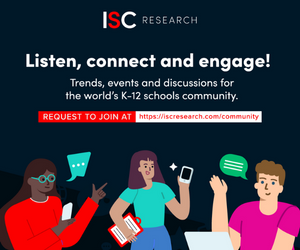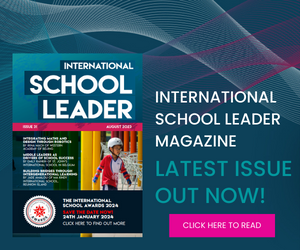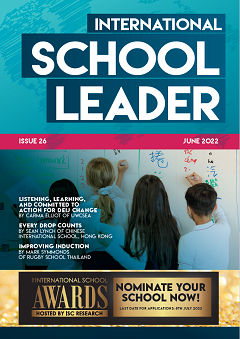By Emily Rankin
Since 2019, the English College in Prague (ECP) has seen year-on-year increases in International Baccalaureate Diploma Programme results, even after a post-pandemic worldwide average decrease. While many incremental improvements across the school have contributed to this success, our recent ‘Outstanding’ British Schools Overseas Penta inspection notes that ECP middle leaders (MLs) “have a strong focus on aligning the academic policies and systems so that the learning experience of the students is of a high quality on a daily basis”.
This work to empower our MLs isn’t incidental; we have aimed to make this group drivers of outstanding teaching and learning, as well as whole-school strategy.
Although international schools have a wide array of ML structures, these practices should be applicable to any school context, given MLs are granted autonomy and support. After all, “middle leaders directly and indirectly impact teacher practice, team development, school reform and professional learning”, states the research article ‘School middle leadership: A systematic review’.
A School Leadership & Management editorial by Alma Harris and Michelle Jones from University of Bath likewise emphasises the effect on children: “The research literature highlights that middle leaders play a pivotal role in securing better learning outcomes for students.”
Innovation
Encouraging risk-taking and evolution – and providing time for it – is an imperative. We have ‘away days’ in place for our ML pastoral and academic teams so they have the space to strategise, create development plans and evolve their specialty areas. A 2016 Teaching Leaders report says “Effective middle leaders encourage exploration and innovation” (Baar, et al), so they need the conditions in order to do so.
As long as we are certain an idea won’t have a negative impact on our students, we support MLs in realising well-planned initiatives. When our ML pastoral team suggested a structural change in our upper school, we implemented it – and our communication and documentation in this area are now more effective. The change, which moved pastoral care away from upper school leadership to senior tutors who stayed with students through both our lower and upper schools, was unique to the bespoke needs of our context.
It’s also important to cut non-essentials for MLs, such as superfluous administrative tasks and pointless meetings, because their roles are busy and complex. That being said, we do have fortnightly meetings between MLs and their senior leader line manager because we feel being a resource and listening ear is crucial.
We also have three joint ML meetings a year where we discuss how we’re meeting whole-school aims around topics such as literacy, wellbeing and student voice. To be able to delegate, we have strong intervention protocols in place so that if something goes awry, senior leaders can provide support. Progress checks and meticulous tracking, for example, allow us to assist if students are inordinately underperforming; no ML should bear responsibility for a problem all by themselves.
Development
According to the aforementioned editorial by Alma Harris and Michelle Jones, “a significant part of the within-school variation can be found at the middle tier, implying that this is a critical layer for support and development”. Recognising this, we not only have a generous CPD provision at ECP but we also assist MLs in finding and accessing the CPD they want and need. It can take the shape of formal training with an accredited body, but it doesn’t have to.
MLs can be connected with other professionals who do their role, or cover can be arranged for them to attend a webinar or do a school visit. We offer long- and short-term job shadowing schemes to aid in creating pathways for colleagues’ own professional journeys. We have also offered secondments, such as for my leadership duties when I took adoption leave.
Empowerment
When strategising, such as for timetabling around an upcoming move due to school reconstruction, we turn to MLs for inclusive input and blue-sky thinking. Questions, potential obstacles and then invaluable solutions are always generated; it’s erroneous to think senior leaders will have all the answers.
There’s not an academic or safeguarding decision that doesn’t go through the relevant ML team. For example, our heads of faculty were central to devising our whole-school Lesson Attributes – the aspects we feel comprise excellence in teaching and learning in our school. We now use these attributes in whole-school learning walks to ground peer feedback in. One or two of our MLs also come to every Governors’ Education Committee meeting to share what they’re working on, and we make a point to celebrate our MLs’ efforts and achievements.
Clarity
Stephen Tierney writes in his book Liminal Leadership, “Part of creating great middle leadership and allowing it to flourish is being explicit about what you expect” (2016). We have put time into developing clear remit descriptions and common, consistent tools and expectations, such as the aforementioned Lesson Attributes, schoolwide ‘Learning Behaviours’ posted in every classroom and a standardised grading ladder, all of which were, of course, shaped and evaluated by our own MLs.
We subscribe to TES Staff Pulse, an anonymous survey where colleagues can provide feedback on many aspects of the school, and one area that cropped up was leadership communication. Thus, we have worked hard to improve and model efficient, transparent and thoughtful communication. We have deliberately discussed with MLs how their work connects with the school’s overall strategic plan, and we have aimed to listen intently as MLs are often barometers for staff sentiment.
Feedback
In Czech, there is the idiomatic saying ‘chodit kolem horké kaše’. It literally means ‘to walk around hot porridge’, but it really means ‘to avoid saying something directly’. Relative to this, not providing constructive feedback does our MLs a disservice.
We have a robust but growth-minded Annual Professional Review process in place where we discuss progress – and if there is a lack of it in an area, we ask why and reframe the goal or provide support. As senior leaders, it’s important to look at ourselves first if an ML is not experiencing success and engage in open dialogue about it.
In summary, steps we have taken to give agency to our MLs are:
- Decentralising work and celebrating MLs in order to empower them
- Giving time, space and support for innovation
- Assisting with finding and accessing professional development
- Communicating clear expectations – and listening
- Providing constructive and thoughtful feedback

Emily Rankin, Ed.S. is the former Deputy Head / Head of Upper School & Whole School Teaching and Learning Lead at the English College in Prague. She is now the Deputy Head / Head of Academics at St. John’s International School in Belgium. Connect with Emily directly via email at [email protected]



